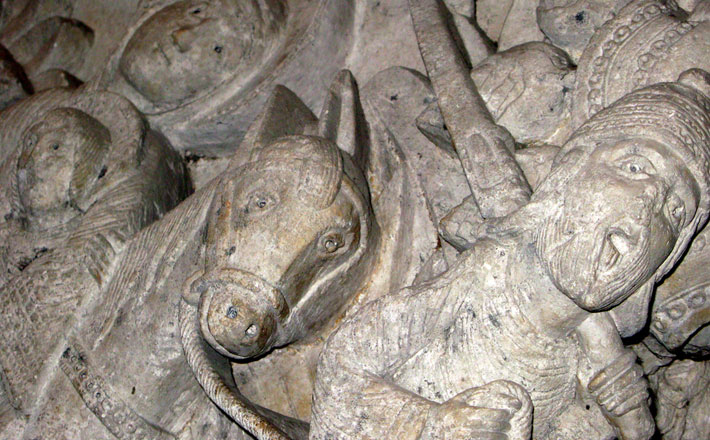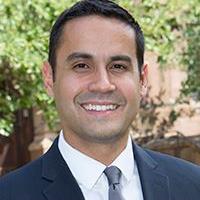Commentary on Matthew 2:13-23
The Gospel reading this day after Christmas strikes a new tone for the season by dramatically leading us away from anticipation of Advent and revelry of the holidays to the tenuous and dark days between promises and their fruition.1
Threats abound, but God carefully orchestrates Jesus’ earliest days according to Matthew.
Though as an infant Jesus cannot act in his own defense, God’s steady protection and Joseph’s faithful obedience combine to ensure his safety in a world of danger. Even as potential disaster threatens Jesus, ancient prophecies come to life and guarantee Jesus’ ineluctable mission.
From the very first, the road Jesus walks is marked by both God’s promises and human resistance. Jesus is both the living presence of God’s promises and a consistent irritant to those in power.
Three prophecies anchor three narrative movements so striking that artists throughout the ages have been drawn to them. Let’s examine them in turn.
Fleeing to Egypt
First, Matthew recounts how Jesus’ family was spared from Herod’s furor. His duplicity and fear were evident the very moment the magi arrived in his kingdom (2:3). Herod’s reputation for brutality was well known in antiquity. Neither his spouses nor his children could escape the effects of his paranoia. Thus, an angel tells Joseph to flee his home and head into exile. For Matthew, this escape is not simply an expedient move or an accident of history. Instead, scripture foresaw this geographical detour on the way to Jesus’ true hometown. God chose this path in the distant past. Citing Hosea 11:1, Matthew appeals to a prophecy originally focused on the people of Israel but now referring to Jesus alone. Matthew’s claim then is that Jesus in some significant sense embodies the people of Israel. He is the recipient, bearer, and fulfillment of the promises made to Israel by God.
Egypt also evokes the story of Moses and the liberation of Israel from the tyranny of slavery, an echo that will reverberate even more powerfully in the next prophetic fulfillment.
The Slaughter of the Innocents
Once Herod realizes that the magi have circumvented the conspiracy to eliminate this newly regnant king of the Jews, his instinct to preserve his power at all costs kicks in. He knows the approximate date of the child’s birth thanks to the magi’s calculations, and so he orders the extermination of all children born “in and around Bethlehem.” Herod will not take the chance that this child has slipped out of the city. According to Matthew, Jeremiah 31:15 had already prophesied the cries of anguish that would arise in Israel over such grievous oppression.
This genocidal act is never mentioned in other ancient witnesses of Herod’s cruelty; Matthew is the sole record of these widespread murders. However, the parallels to the execution of Jewish male infants at the hands of Pharaoh are striking (Exodus 1:15-22). Herod is a new Pharaoh. Feeling his political power slipping away, he lashes out with great malice but also in vain. Both Pharaoh and Herod precipitate devastating losses of life yet ultimately fail to prevent the birth of a powerful leader of Israel. Both Moses and Jesus are born under the threat of death; both are guided by God’s protective hand.
At the same time, one wonders why such preservation did not extend over the other children of Jews in Egypt and Bethlehem. Such questions are not broached directly or indirectly by Matthew. Neither does Matthew dwell on those years lived in exile in Egypt. Instead, he quickly returns Jesus to his hometown as promised by scripture.
Back Home to Nazareth
Though born in Bethlehem, Matthew’s Jesus is from Nazareth. This is the geographical appellation he will carry.
After an angel announces the death of Herod to Joseph, the coast is clear for the family to return home to Bethlehem of Judea. However, after learning that Herod’s son Archelaus now ruled Judea, the family makes a new home in Nazareth in Galilee. For the third time, Matthew points to a prophetic promise: “He will be called a Nazarene.”
However, unlike the first two prophecies, there is no single prophecy in the Hebrew Bible or Septuagint that reads quite like the prophecy Matthew quotes. Is Matthew citing a now lost prophecy? Is Matthew here eliding the difference between Nazirite and Nazarene? Or perhaps is Matthew’s reference to “the prophets” a wide appeal to the many promises of God? Though there is no particular reference we can be certain is Matthew’s source here, the threefold appeal to the scriptural guarantee of Jesus’ earliest days argues that Jesus’ mission is neither coincidence nor solely the product of human effort.
Preparing the Path
Matthew here prepares a prophetic path for Jesus to walk. A seeming detour into Egypt is actually a prophetic call; even Jesus’ hometown reverberates with prophetic resonance.
Potential doom looms over these early chapters of Matthew. Jesus’ welcome to the world is not unanimous acclamation but fear that this child would subvert the order of the world, that a mere child would weaken the powerful. The arbitrariness of Herod would have been entirely familiar to ancient people living under Rome’s long imperial shadow. Most Americans have a difficult time relating to a despotic order of genocide; most Americans tend to trust that authorities are required to act to protect citizens. However, no such trust could have existed within the ambit of ancient Rome’s seemingly unending power.
Therefore, Matthew’s trust in the prophetic promises is not mere naiveté; his faith in not simple. The narrative of these threefold threats upon Jesus’ life bristle with authenticity for such tyranny was well known to ancient peoples. Matthew’s trust in God’s providence emerges not from an overly active credulity but from a faith that expects God to reign in a world where the dominance of the powerful seems unchangeable.
In the midst of the joys of the Christmas season, these passages are a ripe reminder that things might have been otherwise, that tragedy and disappointment are too often the orders of the day, even amidst the revelry of this holiday season. As the poet Jane Kenyon once wrote, “It might have been otherwise.” As the evangelist Matthew might have added, “… but what had been spoken by the prophets was fulfilled.”
Notes
1. Commentary first published on this site on Dec. 26, 2010.


January 1, 2017